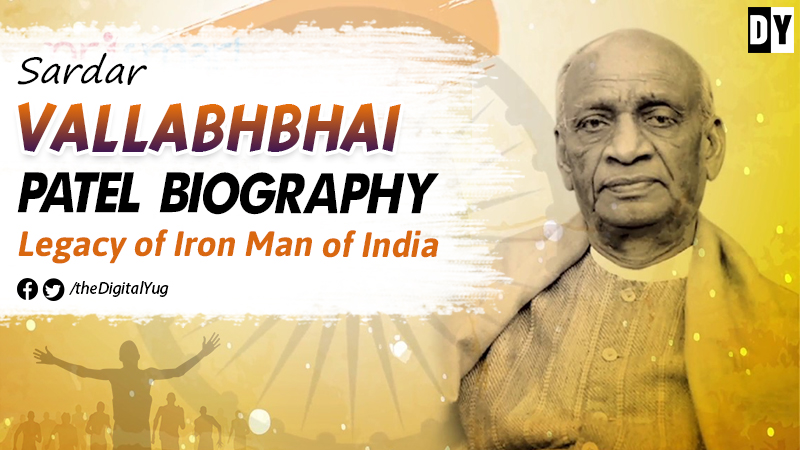


Sardar Vallabhbhai Patel, also known as the "Iron Man of India," played a crucial role in unifying the country after independence. His efforts to integrate over 500 princely states into the Indian Union have left a lasting impact on the nation's integrity. As India celebrates his birth anniversary, let's take a look at the legacy of this great leader who truly earned his title.
Sardar Vallabhbhai Patel: The "Iron Man of India"
Sardar Vallabhbhai Patel, born on October 31, 1875, was a prominent Indian statesman and freedom fighter who played a pivotal role in shaping India's fate after independence.
Background:
Patel was born into a farming family in Nadiad, Gujarat. He trained as a lawyer and returned to India in 1913 after studying in London. During the Indian independence movement, he became a close associate of Mahatma Gandhi and emerged as a key figure in the Indian National Congress.
Role in Unification of India:
One of Patel's most significant contributions was his role in integrating over 500 princely states into the newly formed Indian Union after independence in 1947. Through negotiation, diplomacy, and sometimes military intervention, he successfully brought these states under the control of the Indian government. This process was crucial for the stability and integrity of the young nation.
Iron Man Legacy:
Patel's unwavering determination and ability to achieve his goals earned him the title of "Iron Man of India." He was known for his strong will, decisive action, and pragmatic approach. His leadership during a critical period in India's history helped preserve the country's unity and set it on the path to progress.
Top 5 FAQs:
What is Sardar Patel's full name?
When is Sardar Patel's birthday?
How many princely states did Patel integrate into India?
What is the name of the statue dedicated to Sardar Patel in Gujarat?
What was Patel's role in the Indian independence movement?
Legacy and Remembrance:
Sardar Vallabhbhai Patel's legacy continues to inspire generations of Indians. His vision for a united and strong India remains a cornerstone of the nation's values. Today, countless monuments, institutions, and public spaces bear his name, including the iconic Statue of Unity, the world's tallest statue, built in his honor in Gujarat.

In a significant move, the descendants of Netaji Subhas Chandra Bose have urged Prime Minister Narendra Modi to institute a tradition of hoisting the National Flag at the Red Fort every year, to commemorate the establishment of the Azad Hind Government on October 21. The Azad Hind Government, formed under Netaji's leadership, played a key role in the fight for India's independence during World War II. With the 82nd anniversary of its establishment approaching, this request holds even more significance in honoring the sacrifices made by the Azad Hind Fauj.

Prime Minister Narendra Modi spent Diwali in an unconventional manner, celebrating the festival of lights with Indian Navy personnel onboard the aircraft carrier INS Vikrant. During his visit, Modi praised the INS Vikrant as a symbol of Aatmanirbhar Bharat and also witnessed a stunning air power demo by MiG 29K fighter jets taking off and landing on the short runway of the aircraft carrier. Modi was also deeply moved by a special cultural performance by the sailors, dedicated to the success of the Indian Armed Forces. He ended the evening by joining in the tradition of Bara Khana with the naval personnel. On the next day, Modi joined a yoga session on deck and watched a spectacular steampast of warships and flypast by aircraft.

Indian Prime Minister Narendra Modi celebrated Diwali with Navy personnel on the country's new aircraft carrier, INS Vikrant. He extended Diwali greetings to the nation and shared highlights from his visit, including an air power demonstration and cultural program. PM Modi also addressed the significance of Diwali and expressed his best wishes to the families of the Navy personnel.

In a tense meeting at the White House, President Donald Trump urged Ukrainian President Volodymyr Zelensky to accept Russian President Vladimir Putin's terms for ending the two-year war in Ukraine. Despite seeking more military support from the US, Zelensky was met with resistance from Trump, who reportedly engaged in a "screaming match" with the Ukrainian leader. The US leader even claimed that Putin saw the conflict as a "special operation" rather than a full-fledged war, further complicating negotiations between the two nations.

As Liverpool struggled to find their form in a tough game against Manchester United, Dutch midfielder Cody Gakpo stood out with his sharp attack and strong composure. Despite hitting the woodwork three times, Gakpo managed to score a brilliant equalizer for his team, showcasing his potential and talent on the field. While Liverpool may have lost the match, Gakpo's impressive performance provided a glimmer of hope for a struggling team.

Ayodhya's Deepotsav 2025 was a shining example of faith, community, and innovation as the city set two new world records with over 26 lakh diyas and a grand aarti performed by 2,100 priests. The event, witnessed by Chief Minister Yogi Adityanath, also showcased a spectacular 3D projection mapping and drone light show that brought Lord Ram's story to life in the night sky. The event was a testament to the deep connection Ayodhya's youth have with Lord Ram's ideals and was made possible by the hard work of over 40 potter families and thousands of volunteers.

In a brazen and perfectly orchestrated robbery, a group of thieves infiltrated the world-famous Louvre Museum in Paris on Sunday morning and made off with a collection of priceless jewels with an estimated value in the millions. French officials confirmed the robbery and began a detailed investigation to determine how the culprits managed to evade the museum's advanced security systems and execute the crime in under seven minutes. This latest incident has raised serious concerns about the protection of national treasures at one of the world's most popular tourist destinations.

In an audacious heist, a group of armed thieves breached security at the iconic Louvre Museum in Paris and stole nine valuable jewels from the collection of Napoleon Bonaparte and Empress Joséphine. The robbery, which took place in just seven minutes, has prompted a full-scale police investigation and raised concerns about the museum's security. French officials are working to recover the stolen items, but the Louvre remains closed to visitors.

Despite a ceasefire in early October, the conflict between Israel and Palestine shows no signs of abating, with reports of ongoing deadly clashes and Israeli tank fire targeting a car in Gaza City. The closure of the Rafah border crossing to Egypt, citing Hamas's failure to retrieve bodies, has further exacerbated tensions. However, experts warn of the uncertain future for a transitional government in Gaza and the risk of breaching the fragile ceasefire. The violence and closure highlight the ongoing humanitarian crisis and the need for both sides to engage in peaceful negotiations.

Hundreds of travellers heading to India from Italy for Diwali were left stranded after Air India cancelled its Milan-Delhi flight due to a technical issue. The sudden breakdown of the flight raised concerns about making it home in time for the festival. Some passengers even face the prospect of celebrating Diwali away from home due to rebookings on alternate flights. Air India assured that they are prioritising passenger safety and comfort while providing necessary support to those affected.